Do Church Goers Want To Hear More Politics From the Pews?
This post has been unlocked through a generous grant from the Lilly Endowment for the Association of Religion Data Archives (ARDA). The graphs you see here use data that is publicly available for download and analysis through link(s) provided in the text below.
What exactly happens at a religious service? That’s a really interesting and pertinent question for the kind of work we do as social scientists who study religion. There are a few resources that dig into that question like the National Congregations Study, but it’s very rare to see a more mainstream longitudinal instrument like the General Social Survey ask people what actually happens when they go to church. It’s just too niche for a survey that is really focused on looking at broad trends in American society. Asking folks whether they sing while accompanied by a guitar or a pipe organ is interesting to sociologists of religion, but likely less intriguing to the average American.
What’s also a bit of a black box is what kind of messages are actually being conveyed during Sunday worship. There have been some analyses of sermon texts that were posted on online repositories like Sermon Central. For instance Boussalis, Coan, and Holman analyzed 110,000 sermons to find that most pastors engage in political topics from the pulpit. Another bit of analysis by the same research team (plus Guhin) concluded that evangelical pastors rarely preached on topics like racial justice or poverty. And I would be remiss to not mention that myself and Miles Williams published a piece where we analyzed the preaching style of men and women using 900 sermons we acquired from an online database.
All that research is incredibly important and I would applaud any scholars who continue to go down that road of analysis, but there’s another side to this coin - how much of that political speech actually gets successfully transmitted to folks in the pews? And, are those regular attenders actually receptive to hearing those kinds of politically charged messages? This research from Scheitle and Cornell found that there’s often a significant mismatch between what the clergy say that they are speaking about and what is actually received by the congregants.
In August of 2022, PRRI fielded a survey (that’s hosted on the ARDA), which asked folks a bunch of questions about what they are actually hearing at their local church and how they think about the political identity of their congregation. Let’s start with this question that was only asked to people who were regularly attending church - “how often does the clergy at your church ever talk about…”
Well, I think the biggest takeaway from this graph is that very few houses of worship are talking about political issues on a regular basis. In this data, just 2% of folks said that their pastor talked about Donald Trump or voter fraud often. In contrast, 70% said that they never heard such topics discussed from the pulpit and another 20% say it was rarely brought up. The idea that most churches were speaking for or against Donald Trump is just not supported by this data.
Now, that’s not to say that pastors were completely apolitical from the pulpit. In the entire sample of church goers, 43% said that they talked about abortion at least sometimes and it was 44% who spoke about racism at a regular interval. But clearly the most touched upon issue was poverty and inequality. In this data, 20% of people said that their clergyperson spoke about it often and 46% said it was brought up sometimes.
But, of course, this depends on what type of church we are talking about, right? Evangelical churches are different from Catholic congregations and so on. Let me break this down into the five religious groups that had a large enough sample to do some more granular analysis.
For abortion, there are clearly two groups emerging here - Catholics and evangelicals talk about the issue quite a bit. However, it’s not really a topic of discussion for both non-evangelical Protestants and Latter-day Saints. I was struck by the fact that only 18% of Mormons said it was brought up sometimes or often. There was much less variation when it comes to Trump and voter fraud. It should be clear from the prior graph that neither topic was that popular among members of the clergy - but there is a clear pattern in the data. Evangelicals were the most likely to bring up Donald Trump and LDS were the least likely. That was also true for election fraud. Now, the issue here is that we can’t be sure of the context of either of these mentions. It could be pastors extolling the “Stop the Steal” movement or excoriating those in the pews who held that view. We just don’t know.
Now, when it comes to poverty and equality, and racism there’s a lot more discussion happening. These topics seem to come up quite a bit in all types of religious contexts. That’s what strikes me about the ‘racism’ graph specifically. The numbers vary only a little across traditions. On the topic of poverty, there is a clear difference, though. Evangelicals and LDS leaders are about 13 points less likely to speak about it compared to Catholics and the mainline.
Okay, so let me broaden this analysis just a bit to try and understand how churchgoers understand the political climate of their church. This question asked them to think about their church five years ago versus today.
I didn’t know what to expect, but I was still pretty surprised to see the results. Among evangelicals, just 9% of them think that their congregation is more politically divided now compared to five years prior, while 65% didn’t see it that way. Considering evangelicals are politically homogeneous now, maybe this means that the political sorting was already completed during Trump’s first term. For the non-evangelicals and the Catholics, about 17% said that they were more politically divided. But one interesting difference is that Catholics were the most likely to say that they were “unsure” about this one. I think this is partly due to the size of the local Catholic parishes. Many towns have dozens of Protestant churches, but only one Catholic house of worship. That means that it’s hard to fully understand the political contours of the congregation.
The other thing that I keep thinking about is the result for Latter-day Saints. A quarter of them thought their church was more politically divided in 2022 than 2017. That was ten points higher than any other group and 17 points higher than evangelicals. I’ve written before about the fact that younger Latter-day Saints tend to be more politically diverse compared to older Mormons. That may be driving these results, but it’s hard to know for certain.
Then, there’s this other set of questions that asked people, “How well would you say your church is doing addressing the following difficult issues?”
I have stared at these results for a while and I just don’t know how to make sense of them. One thing that does jump out is that rank and file Catholics are not super pleased with how their church is addressing a bunch of hot button issues. For instance, just 20% say that their priest is doing a good job on topics like white supremacy and LGBTQ+ discrimination. Even on abortion, the numbers are pretty low - just 32%. If I were to guess, this may be due to the political diversity inside the Church. It’s hard to address issues like same-sex marriage when the priest knows that a huge chunk of rank and file are going to disagree (no matter what he says).
Non-evangelicals score a bit higher on this metric than the Catholics, but not by a whole lot. Then evangelicals are next in line. For four out of five issues, the share who say that their church is doing a good job is 45%. The real outlier is the LGBTQ+ discrimination question, which scored about seven points lower. Again, the problem here is direction. We don’t know if some folks are mad that their pastor is speaking against same-sex marriage or if others are upset because he isn’t taking a harder line. It’s probably some of both, really.
But let me end with this bit of analysis that may get us to a satisfactory conclusion. People are given the statement, “I wish my church talked more about political division in this country.” To me, this one is different because it’s aspirational. It’s not about what my church is currently doing. It’s about what I want it to do.
I get the very clear sense from this data that any pastor who chooses to speak up about political division in the United States is going to anger a whole lot of their flock. In most churches, 40-50% of people think that their clergy should avoid discussions of political division completely. Then, another 30-40% mostly think that this is a bad idea. You just don’t see a lot of church going folks who are keen on their pastor talking about what is going on in the world of politics, just the opposite.
Doing a lot of public facing work on religion has taught me that a significant number of people who aren’t religious or don’t attend church on a regular basis have a misperception about what happens on a Sunday morning. The vast majority of pastors aren’t talking about politics on a regular basis and when they touch on anything that may be in the political realm it’s about topics like racism and income inequality. Both can be discussed in fairly apolitical ways.
The other side of this is that huge majorities of congregations just want to avoid politics entirely from the pulpit. They don’t want their pastor or priest to try and discuss the political divides that we are facing. Being around church people my entire life, that’s the clear impression I’ve always gotten. They see Sunday worship as a respite from all the Culture Wars and the talking heads and the political battles that seem to consume our every waking moment.
Yes, there are pastors who are expressly political. You often see them on social media - but this data makes the point clear: these religious leaders are outliers. They must be understood in that context.
Code for this post can be found here.




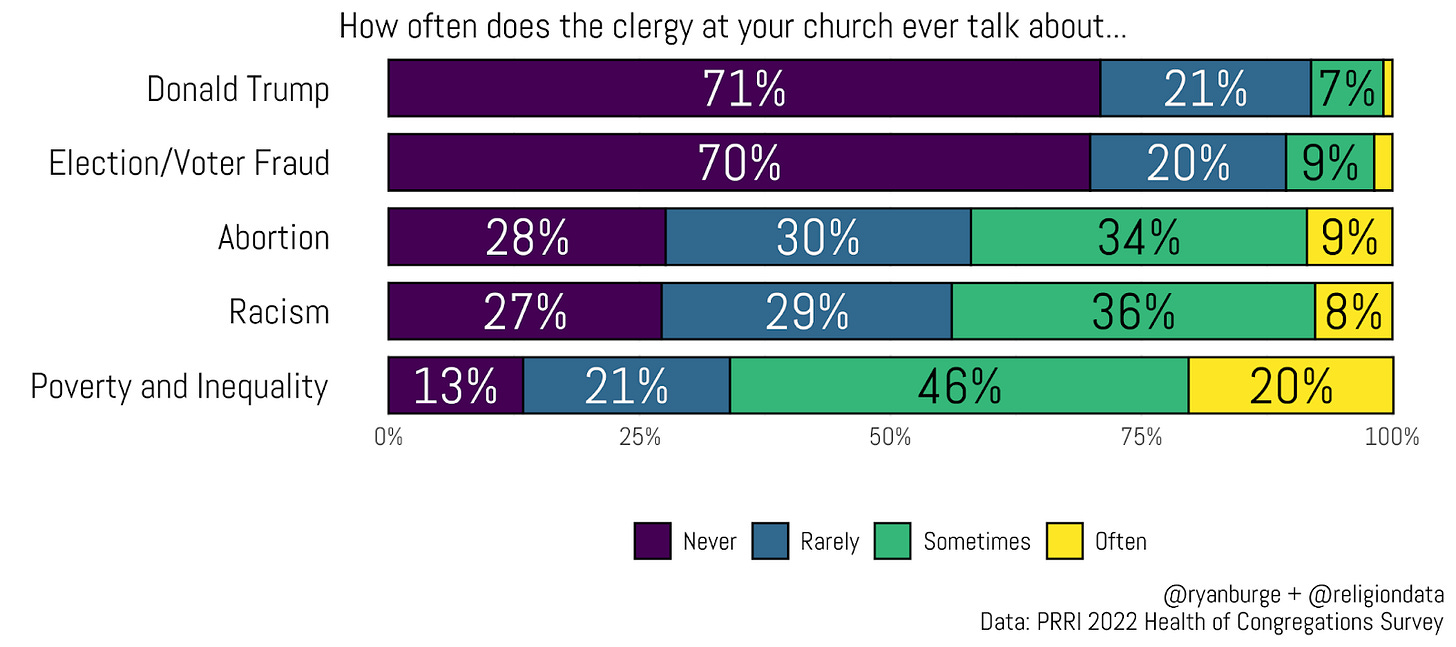
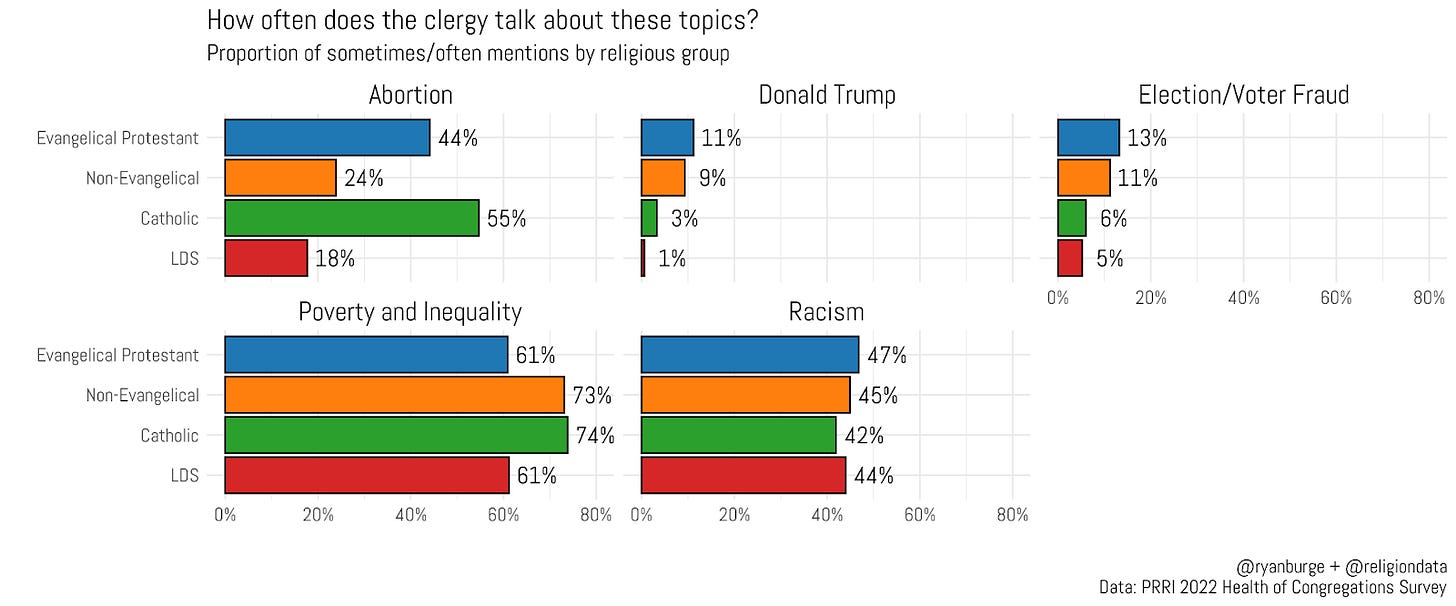
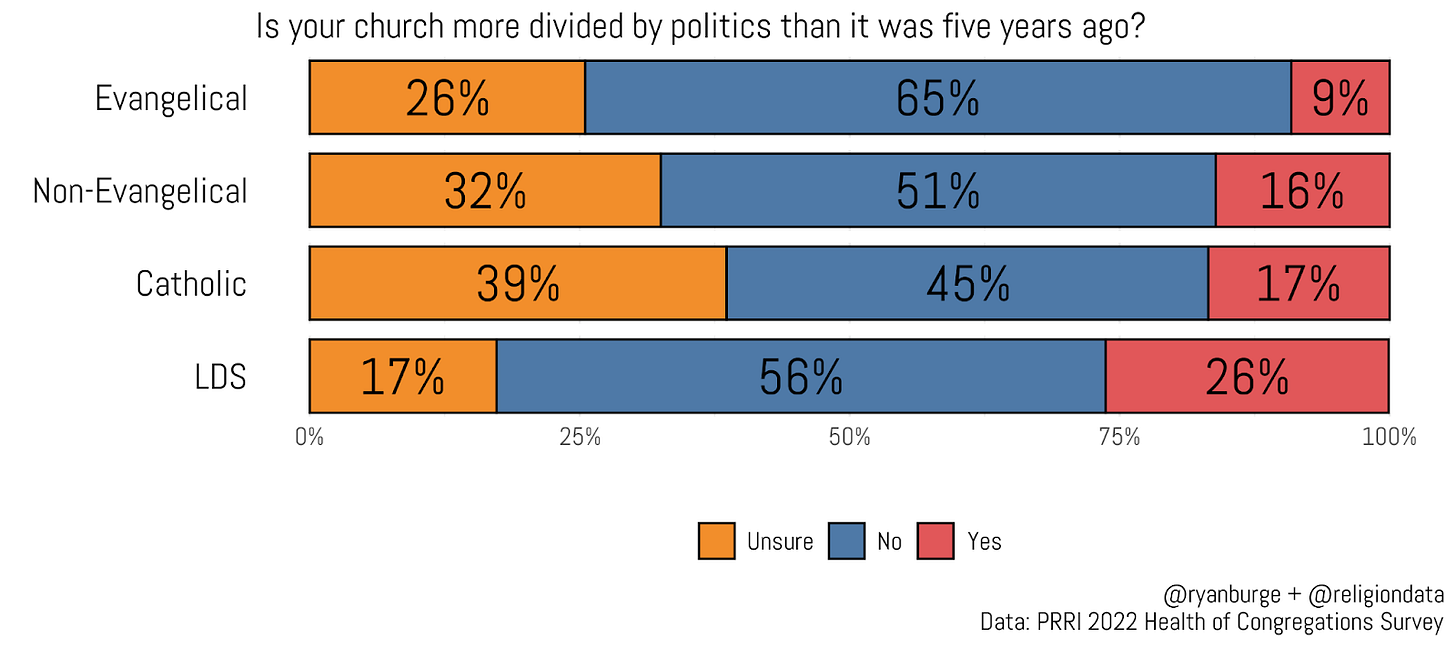
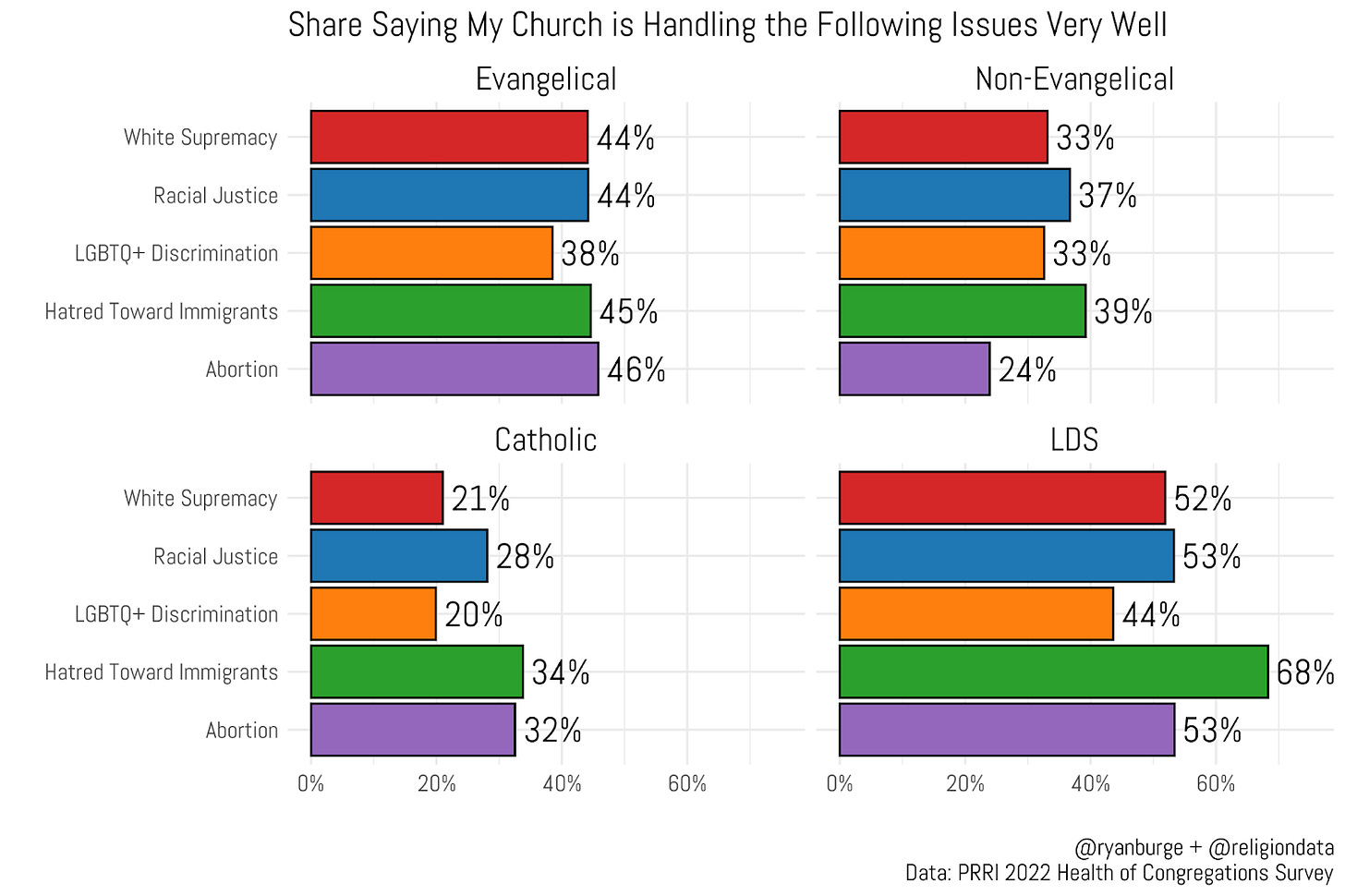
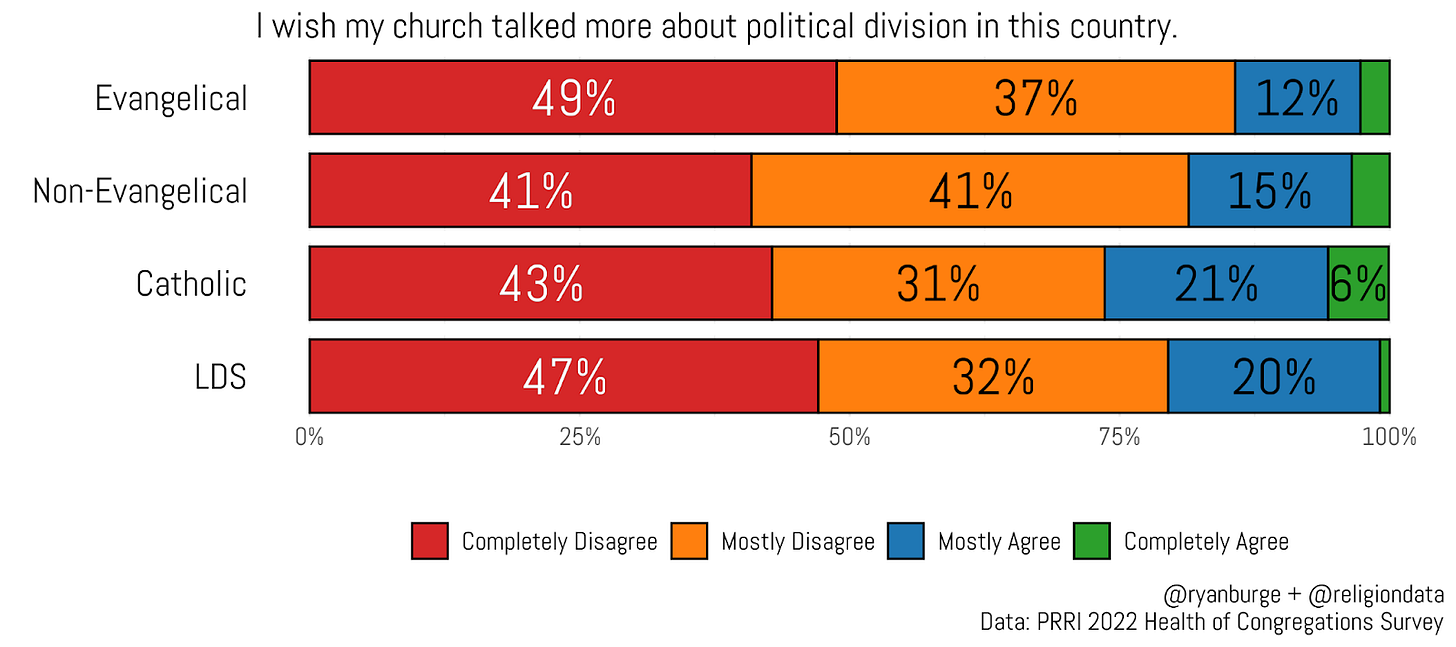
Great writeup! Loved the numbers on LDS.
My personal theory about the increased sense of division from LDS (that you mentioned) is from the Trump era. I think when the respondent reads "5 years ago" in 2022 they think "before Trump." LDS obviously have a strong Republican base, but there are a lot complicated feelings for Trump compared to Romney. A lot of LDS people have a soft spot for immigration which is a key Trump issue. I wouldn't be surprised if young LDS people felt this division more though since they are more politically diverse than older members.
Nice post!
Personally, I really don’t like to hear politics at church. References to having compassion for various groups of people or things in the world are fine with me (to some extent isn’t that pretty Jesus-y?), but I quickly get turned off if it gets more explicitly political. I once heard a reference to executive orders and thought “please please no, there are so many other places to talk about that!”